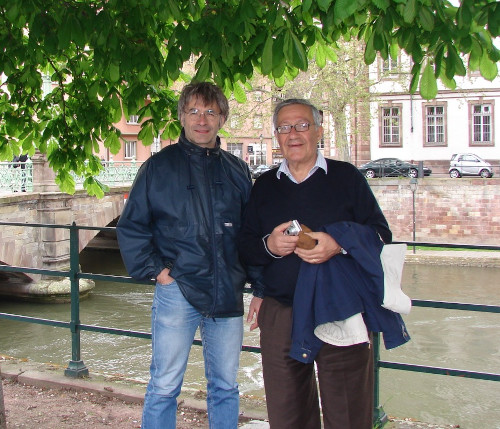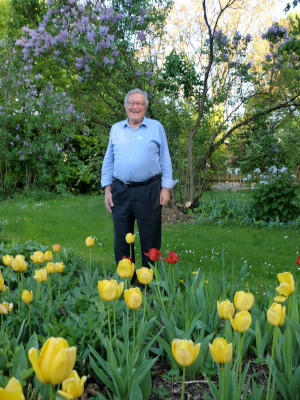by Mauro Castagnaro

[Italian]

Today we are sad. Vittorio was taken from us too suddenly. And I, who for the last 20 years have been perhaps his closest collaborator inhis main commitment, the association Noi siamo Chiesa, and I have certainly shared with him many trips abroad, for the meetings of the international networks to which we belong and for the World Social Forums, I am very sad. I was not prepared for his death!
However, a part of me tells me that I shouldn't be sad, we shouldn't be. Not only because, for those who are Christians, as Vittorio was in a passionate and profound way, he is now in the fullness of God's love, but because his earthly life was intense, fruitful, rich in encounters, relationships, dreams, projects, in short, it was a beautiful life! I dare to believe that Vittorio was a happy person.
First of all, because it was a life entirely spent on the right side, that of the last, the oppressed, the excluded and the struggles for their liberation, for their emancipation, starting from the faith lived with such naturalness that it should never be flaunted or ever denied, in a coherent and tireless civil and political commitment. Then because she was led into a family that made one think of that of the blessed of Psalm 128: "Your bride as a fruitful vine in the intimacy of your home; your children like olive shoots around your table": Pinuccia, the right life partner, those he called, with a term for me a bit curious or, "my children" and the grandchildren to whose thought he let himself go to smug laughter "without ifs and buts" or of whom he spoke to me at length (I remember in particular of Miriam in I don't know which airport anymore a few years ago). Finally, because it was studded with so many passions she enjoyed, the mountains and the marathon tell me, I know botany or the ancient editions of the Bible.
Vito Nocera in these days has used for Vittorio words that seemed very apt: "His was a tolerant, inclusive radicalism. To an absolute rigor he combined an innate common sense". This is how I met him too, in the many meetings in which he always said and defended his thoughts, but without ever letting himself go to the angry reaction and even less to lapse into personal attack, even when he was the object of ungenerous or unjustified criticism; it was consistent, but not intransigent; Heseemed to go against the tide, but with meekness. And it struck me that on April 12 Jacques Gaillot also died, the courageous and humble bishop of Evreux removed in 1995 whom Vittorio himself had invited to Milan and hosted at home.
 Vittorio and Mauro in conferenceVittorio has a deep culture, which allowed him a robust intellectual elaboration, with a great organizational capacity, which translated into a little visible and patient work of weaving relationships; He had a broad and long gaze, which allowed him to propose daring projects, but he did not disdain concrete work, so while preparing detailed analyses on the ecclesial reality he literally carried on his shoulders the books and pamphlets of the movement to be disseminated.
Vittorio and Mauro in conferenceVittorio has a deep culture, which allowed him a robust intellectual elaboration, with a great organizational capacity, which translated into a little visible and patient work of weaving relationships; He had a broad and long gaze, which allowed him to propose daring projects, but he did not disdain concrete work, so while preparing detailed analyses on the ecclesial reality he literally carried on his shoulders the books and pamphlets of the movement to be disseminated.
All this, added to the sobriety and personal generosity, made Vittorio a natural leader, but nothing seemed aliento him or as much as promoting himself. Vittorio has been a protagonist of ecclesial and political history of the last 60 years, but exempt from any form of personal protagonism, often in leadership roles, but always assumed out of a sense of responsibility, without even a hint of that rather frequent narcissism even in small organizations. I never saw him do anything (a gesture, a word, an intervention) that could even remotely be aimed at obtaining recognition, a role, an assignment, any personal advantage. The struggle for power (big or small) not only did not interest him, it was completely foreign to him! His commitment was the result of authentic fidelity to his ideas, to the cause (Vittorio Agnoletto spoke affectionately of "naïvetà", I like it better thanking "clarity"), which in the final analysis was for him that of the Gospel. And it is precisely this way of exercising leadership in terms of disinterested service that has been for me a great Christian witness, a living example of that "but among you it is not so" that Jesus teaches his disciples about evangelical power, opposed to the ruler of the "leaders of nations", as well as, it is worth recalling today, an indispensable precondition for overcoming the crisis of politics.
Hello Vittorio! Getting to know you was lucky. Thanks for everything!
Oggi siamo tristi. Vittorio ci è stato tolto troppo repentinamente. E io, che negli ultimi 20 anni sono stato forse il suo più stretto collaboratore nel suo principale impegno, l’associazione Noi siamo Chiesa, e certamente ho condiviso con lui molti viaggi all’estero, per le riunioni delle reti internazionali cui aderivamo e per i Forum sociali mondiali, sono molto triste. Non ero preparato alla sua morte!
Tuttavia una parte di me mi dice che non dovrei essere triste, non dovremmo esserlo. Non solo perché, per chi è cristiano, come Vittorio era in modo appassionato e profondo, egli ora è nella pienezza dell’amore di Dio, ma perché la sua vita terrena è stata intensa, feconda, ricca di incontri, di relazioni, di sogni, di progetti, insomma è stata una vita bella! Io oso credere che Vittorio sia stato una persona felice.
Intanto perché è stata una vita tutta spesa dalla parte giusta, quella degli ultimi, degli oppressi, degli esclusi e delle lotte per la loro liberazione, per la loro emancipazione, a partire dalla fede vissuta con tale naturalezza da non dover mai essere sbandierata né poter essere mai negata, in un impegno civile e politico coerente e instancabile. Poi perché è stata condotta in una famiglia che faceva pensare a quella del beato del salmo 128: “La tua sposa come vite feconda nell'intimità della tua casa; i tuoi figli come virgulti d'ulivo intorno alla tua mensa”: Pinuccia, la giusta compagna di vita, quelli che chiamava, con un termine per me un po’ curioso, “i miei figlioli” e i nipoti al cui pensiero si lasciava andare a compiaciute risate “senza se e senza ma” o di cui mi parlava a lungo (ricordo in particolare di Miriam in non so più quale aeroporto qualche anno fa). Infine perché è stata costellata di tante passioni di cui godeva, mi dicono la montagna e la maratona, io so la botanica o le edizioni antiche della Bibbia.
Vito Nocera in questi giorni ha usato per Vittorio parole che mi sono parse molto azzeccate: “La sua era una radicalità tollerante, inclusiva. A un rigore assoluto coniugava un innato buonsenso”. Così l’ho conosciuto anch’io, nelle molte riunioni in cui sempre diceva e difendeva il proprio pensiero, ma senza mai lasciarsi andare alla reazione irosa e men che meno scadere nell’attacco personale, anche quando era oggetto di critiche ingenerose o immotivate; era coerente, ma non intransigente; sapeva andare controcorrente, ma con mitezza. E mi ha colpito che il 12 aprile sia morto anche Jacques Gaillot, il coraggioso e umile vescovo di Evreux rimosso nel 1995 che proprio Vittorio aveva invitato a Milano e ospitato in casa.
Vittorio univa una profonda cultura, che gli consentiva una robusta elaborazione intellettuale, con una grande capacità organizzativa, che traduceva in un poco visibile e paziente lavoro di tessitura di relazioni; aveva uno sguardo ampio e lungo, che gli permetteva di proporre progetti arditi, ma non disdegnava il lavoro concreto, per cui mentre preparava dettagliate analisi sulla realtà ecclesiale si caricava letteralmente sulle spalle i libri e gli opuscoli del movimento da diffondere.
Tutto ciò, sommato alla sobrietà e alla generosità personali, faceva di Vittorio un leader naturale, ma nulla gli risultava alieno quanto il promuovere se stesso. Vittorio è stato un protagonista della storia ecclesiale e politica degli ultimi 60 anni, ma esente da ogni forma di protagonismo personale, spesso in ruoli di direzione, però sempre assunti per senso di responsabilità, senza neppure un accenno di quel narcisismo piuttosto frequente anche in piccole organizzazioni. Mai l’ho visto fare qualcosa (un gesto, una parola, un intervento) che potesse anche lontanamente risultare finalizzato a ottenere un riconoscimento, un ruolo, un incarico, un qualsiasi vantaggio personale. La lotta per il potere (piccolo o grande che fosse) non solo non gli interessava, gli era del tutto estranea! Il suo impegno era frutto di autentica fedeltà alle sue idee, alla causa (Vittorio Agnoletto ha parlato affettuosamente di “ingenuità”, a me piace di più dire “limpidezza”), che in ultima analisi era per lui quella del Vangelo. E proprio questo modo di esercitare la leadership in termini di servizio disinteressato è stato per me una grande testimonianza cristiana, esempio vivo di quel “ma tra voi non è così” che Gesù insegna ai discepoli sul potere evangelico, opposto a quello dominatore dei “capi delle nazioni”, oltre che, vale la pena richiamarlo oggi, un’indispensabile precondizione per superare la crisi della politica.
Ciao Vittorio! Conoscerti è stata una fortuna. Grazie di tutto!
